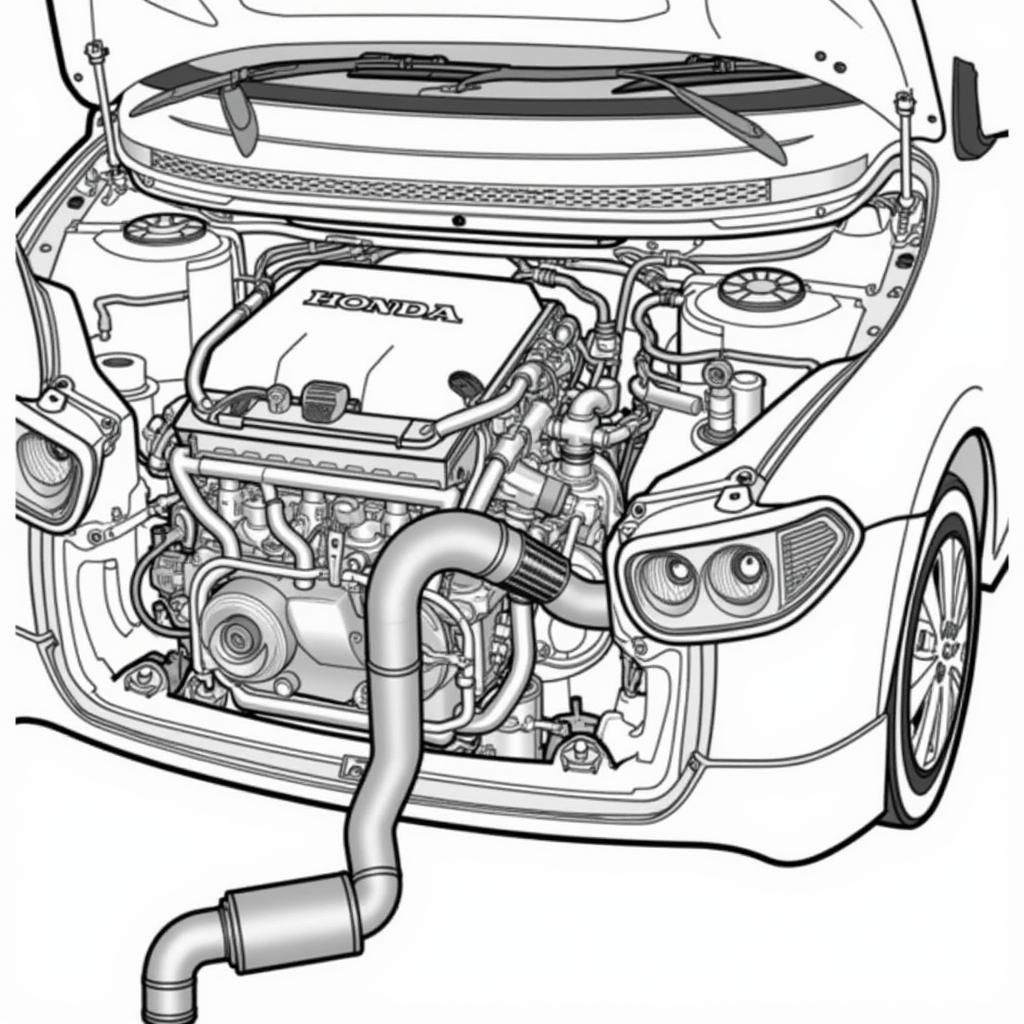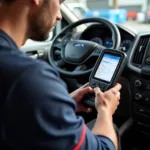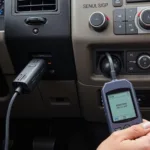A flashing check engine light can be a driver’s worst nightmare, especially when it’s accompanied by a cryptic OBD2 code like P0430. For Honda owners, this code is a common but frustrating issue that often points to a problem with the catalytic converter system. This article delves into the intricacies of the Honda OBD2 code P0430, explaining its meaning, potential causes, symptoms, diagnostic procedures, and repair options.
Understanding OBD2 Code P0430
OBD2 code P0430 stands for “Catalyst System Efficiency Below Threshold (Bank 2).” In simpler terms, this code indicates that the catalytic converter responsible for reducing harmful emissions from the engine’s exhaust is not performing efficiently. The “Bank 2” part of the code refers to the side of the engine that doesn’t contain cylinder #1.
What Causes Honda OBD2 Code P0430?
A variety of factors can trigger a P0430 code in Honda vehicles. Some of the most common culprits include:
- Faulty Catalytic Converter: The most likely cause, a failing catalytic converter, can occur due to age, high mileage, or exposure to contaminants like engine oil or coolant.
- Oxygen Sensor Malfunction: Oxygen sensors monitor the exhaust stream and relay data to the engine control unit (ECU). A malfunctioning sensor can send inaccurate readings, leading to a false P0430 code.
- Exhaust Leaks: Leaks in the exhaust system, especially before the catalytic converter, can disrupt the exhaust flow and affect the sensor readings, triggering the code.
- Engine Misfires: When an engine misfires, unburned fuel can enter the exhaust system and damage the catalytic converter over time.
- Faulty Fuel System: Issues like a leaking fuel injector or a malfunctioning fuel pressure regulator can disrupt the air-fuel mixture, leading to incomplete combustion and potential catalytic converter damage.
 Location of Catalytic Converter in a Honda Engine
Location of Catalytic Converter in a Honda Engine
Recognizing the Symptoms
While the check engine light is the most obvious sign of a P0430 code, other symptoms may include:
- Decreased Fuel Economy: A drop in miles per gallon can indicate a problem with the catalytic converter’s efficiency.
- Reduced Engine Performance: Sluggish acceleration or a lack of power, especially during uphill climbs, can be a sign of a failing catalytic converter.
- Sulfur-like Odor: A strong, unpleasant smell resembling rotten eggs coming from the exhaust is a telltale sign of a damaged catalytic converter.
Diagnosing Honda OBD2 Code P0430
Accurately diagnosing the root cause of a P0430 code requires a systematic approach:
- Read the Code: Connect an OBD2 scanner to the vehicle’s diagnostic port to retrieve the code and any other stored codes.
- Inspect for Exhaust Leaks: Visually examine the exhaust system for any signs of leaks, such as cracks, holes, or loose connections. Pay close attention to the area around the catalytic converter.
- Check Oxygen Sensor Operation: Use a multimeter to test the voltage readings of the oxygen sensors upstream and downstream of the catalytic converter. Compare the readings to the manufacturer’s specifications.
- Inspect for Engine Misfires: Check for stored engine misfire codes or perform a cylinder balance test to identify any potential misfires.
- Evaluate Fuel System Performance: Inspect for fuel leaks, check fuel pressure, and examine the fuel injectors for proper operation.
Repairing the Problem
Once the underlying cause of the P0430 code is identified, the appropriate repair measures can be taken. These may include:
- Catalytic Converter Replacement: If the catalytic converter is damaged or failing, replacement is usually the only option.
- Oxygen Sensor Replacement: Faulty oxygen sensors should be replaced with OEM-quality parts to ensure accurate readings.
- Exhaust Leak Repair: Repairing exhaust leaks, whether by welding, clamping, or replacing damaged components, is crucial for restoring proper exhaust flow.
- Addressing Engine Misfires: Resolving engine misfires by replacing faulty spark plugs, ignition coils, or addressing fuel delivery issues can prevent further damage to the catalytic converter.
- Fuel System Repair: Repairing fuel leaks, replacing faulty injectors, or addressing fuel pressure issues can restore the proper air-fuel mixture.
Conclusion
The Honda OBD2 code P0430, while a common issue, shouldn’t be ignored. Addressing the problem promptly can prevent further damage to your vehicle’s emissions system and ensure optimal engine performance.
Remember, regular vehicle maintenance, including timely oil changes and spark plug replacements, can go a long way in preventing catalytic converter issues and other engine problems. If you encounter a P0430 code or any other warning signs, consult a qualified mechanic for a thorough diagnosis and repair.
FAQs
Q1: Can I still drive my Honda with a P0430 code?
While you may be able to drive short distances with a P0430 code, it’s not advisable. Driving with a faulty catalytic converter can lead to further damage to your vehicle’s emissions system and may even result in failing an emissions test.
Q2: How much does it cost to replace a Honda catalytic converter?
The cost of replacing a catalytic converter can vary depending on the make, model, and year of your Honda, as well as labor costs in your area. Generally, you can expect to pay anywhere from a few hundred to over a thousand dollars for a replacement.
Q3: How long does a Honda catalytic converter last?
A well-maintained Honda catalytic converter can last for the lifetime of the vehicle. However, factors like driving habits, fuel quality, and exposure to contaminants can shorten its lifespan.
Q4: Are there any aftermarket catalytic converters available for Hondas?
Yes, there are aftermarket catalytic converters available for Honda vehicles. However, it’s crucial to choose reputable brands that meet or exceed OEM specifications to ensure proper fit and performance.
Q5: Can a bad oxygen sensor cause a P0430 code?
Yes, a malfunctioning oxygen sensor, particularly one located downstream of the catalytic converter, can send inaccurate readings to the ECU, potentially triggering a P0430 code.
Q6: What is the difference between OBD2 codes P0420 and P0430?
Both codes indicate a problem with the catalytic converter system’s efficiency. However, P0420 refers to “Bank 1,” which is the side of the engine that contains cylinder #1, while P0430 refers to “Bank 2,” the opposite side.
Q7: Can I fix a P0430 code myself?
While some repairs, like replacing oxygen sensors, can be done by experienced DIYers, it’s generally recommended to consult a qualified mechanic for accurate diagnosis and repair, especially when dealing with the catalytic converter.
Explore More Honda OBD2 Codes
For insights into other Honda OBD2 codes, check out our comprehensive list of honda obd2 codes.
Need Help with Your Honda Civic?
Find specific information and troubleshooting tips for the 2008 Honda Civic and its common OBD2 codes in our dedicated article on honda civic 2008 pinos obd2.
Get Expert Assistance
If you need assistance with diagnosing or resolving a Honda OBD2 code, our team of automotive experts is here to help. Contact us via WhatsApp at +1(641)206-8880 or email us at [email protected]. We offer 24/7 customer support to address your automotive concerns.

